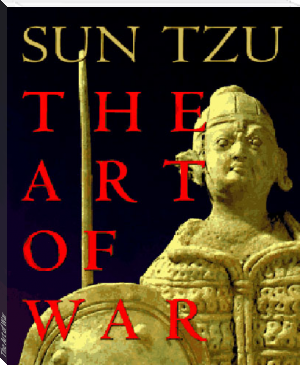The Art of War - Zi Sun (best books to read for success .txt) 📗

- Author: Zi Sun
- Performer: 0976072696
Book online «The Art of War - Zi Sun (best books to read for success .txt) 📗». Author Zi Sun
so that you may control the situation.
[Mei Yao-ch`en understands the whole sentence to mean: Take the strictest precautions to ensure secrecy in your deliberations.]
65. If the enemy leaves a door open, you must rush in. 66. Forestall your opponent by seizing what he holds dear,
[Cf. supra, ss. 18.]
and subtly contrive to time his arrival on the ground.
[Ch`en Hao`s explanation: "If I manage to seize a favorable position, but the enemy does not appear on the scene, the advantage thus obtained cannot be turned to any practical account. He who intends therefore, to occupy a position of importance to the enemy, must begin by making an artful appointment, so to speak, with his antagonist, and cajole him into going there as well." Mei Yao-ch`en explains that this "artful appointment" is to be made through the medium of the enemy's own spies, who will carry back just the amount of information that we choose to give them. Then, having cunningly disclosed our intentions, "we must manage, though starting after the enemy, to arrive before him (VII. ss. 4). We must start after him in order to ensure his marching thither; we must arrive before him in order to capture the place without trouble. Taken thus, the present passage lends some support to Mei Yao-ch`en's interpretation of ss. 47.]
67. Walk in the path defined by rule,
[Chia Lin says: "Victory is the only thing that matters, and this cannot be achieved by adhering to conventional canons." It is unfortunate that this variant rests on very slight authority, for the sense yielded is certainly much more satisfactory. Napoleon, as we know, according to the veterans of the old school whom he defeated, won his battles by violating every accepted canon of warfare.]
and accommodate yourself to the enemy until you can fight a decisive battle.
[Tu Mu says: "Conform to the enemy's tactics until a favorable opportunity offers; then come forth and engage in a battle that shall prove decisive."]
68. At first, then, exhibit the coyness of a maiden, until the enemy gives you an opening; afterwards emulate the rapidity of a running hare, and it will be too late for the enemy to oppose you.
[As the hare is noted for its extreme timidity, the comparison hardly appears felicitous. But of course Sun Tzu was thinking only of its speed. The words have been taken to mean: You must flee from the enemy as quickly as an escaping hare; but this is rightly rejected by Tu Mu.]
[1] Giles' Biographical Dictionary, no. 399.
[2] "The Science of War," p. 333.
[3] "Stonewall Jackson," vol. I, p. 421.
————————————————————————————————-
XII. THE ATTACK BY FIRE[Rather more than half the chapter (SS. 1-13) is devoted to the subject of fire, after which the author branches off into other topics.]
1. Sun Tzu said: There are five ways of attacking with fire. The first is to burn soldiers in their camp;
[So Tu Mu. Li Ch`uan says: "Set fire to the camp, and kill the soldiers" (when they try to escape from the flames). Pan Ch`ao, sent on a diplomatic mission to the King of Shan-shan [see XI. ss. 51, note], found himself placed in extreme peril by the unexpected arrival of an envoy from the Hsiung-nu [the mortal enemies of the Chinese]. In consultation with his officers, he exclaimed: "Never venture, never win! [1] The only course open to us now is to make an assault by fire on the barbarians under cover of night, when they will not be able to discern our numbers. Profiting by their panic, we shall exterminate them completely; this will cool the King's courage and cover us with glory, besides ensuring the success of our mission.' the officers all replied that it would be necessary to discuss the matter first with the Intendant. Pan Ch`ao then fell into a passion: 'It is today,' he cried, 'that our fortunes must be decided! The Intendant is only a humdrum civilian, who on hearing of our project will certainly be afraid, and everything will be brought to light. An inglorious death is no worthy fate for valiant warriors.' All then agreed to do as he wished. Accordingly, as soon as night came on, he and his little band quickly made their way to the barbarian camp. A strong gale was blowing at the time. Pan Ch`ao ordered ten of the party to take drums and hide behind the enemy's barracks, it being arranged that when they saw flames shoot up, they should begin drumming and yelling with all their might. The rest of his men, armed with bows and crossbows, he posted in ambuscade at the gate of the camp. He then set fire to the place from the windward side, whereupon a deafening noise of drums and shouting arose on the front and rear of the Hsiung-nu, who rushed out pell-mell in frantic disorder. Pan Ch`ao slew three of them with his own hand, while his companions cut off the heads of the envoy and thirty of his suite. The remainder, more than a hundred in all, perished in the flames. On the following day, Pan Ch`ao, divining his thoughts, said with uplifted hand: 'Although you did not go with us last night, I should not think, Sir, of taking sole credit for our exploit.' This satisfied Kuo Hsun, and Pan Ch`ao, having sent





Comments (0)